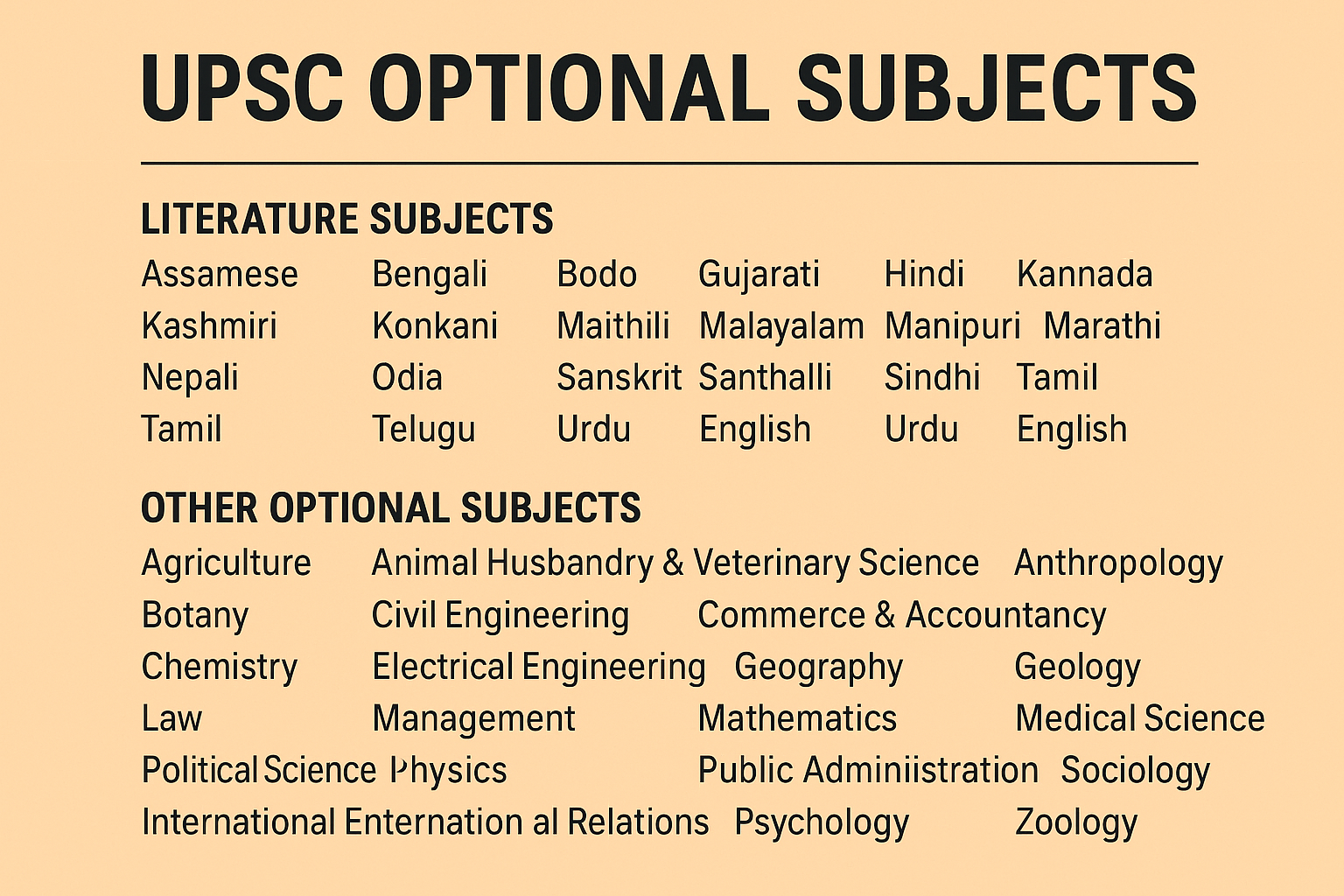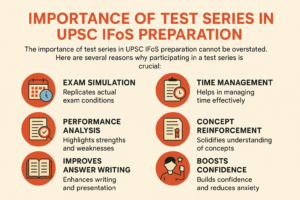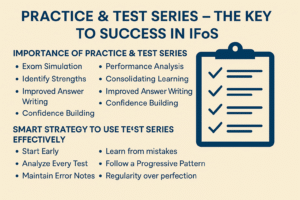The Union Public Service Commission (UPSC) Civil Services Examination (CSE) is one of the most prestigious competitive exams in India. The exam is conducted in three stages – Prelims, Mains, and Interview. In the Mains Examination, aspirants have to choose one optional subject in addition to the General Studies papers and Essay.
Selecting the right optional subject is a game-changer. It can significantly boost your overall score and determine your final rank in the UPSC CSE. This article provides a comprehensive guide on UPSC optional subjects, including the list, selection strategy, scoring trends, and FAQs.
Importance of Optional Subjects in UPSC Mains
Weightage in Mains
The optional subject carries 500 marks (two papers of 250 marks each).
This is nearly 25% of the total Mains marks, making it a deciding factor in final results.
Opportunity to Maximize Score
Aspirants who choose wisely can score 270–320+ in optional, giving a huge edge in the merit list.
Overlap with General Studies (GS)
Some optionals like History, Geography, Political Science, Sociology, and Public Administration have significant overlap with GS, which reduces preparation time.
Complete List of UPSC Optional Subjects
The UPSC offers a wide range of optional subjects covering different disciplines. Below is the list of UPSC optional subjects:
Literature Subjects (23)
Assamese, Bengali, Bodo, Dogri, Gujarati, Hindi, Kannada, Kashmiri, Konkani, Maithili, Malayalam, Manipuri, Marathi, Nepali, Odia, Punjabi, Sanskrit, Santhali, Sindhi, Tamil, Telugu, Urdu, English.
Other Optional Subjects (25)
Agriculture
Animal Husbandry & Veterinary Science
Anthropology
Botany
Chemistry
Civil Engineering
Commerce & Accountancy
Economics
Electrical Engineering
Geography
Geology
History
Law
Management
Mathematics
Mechanical Engineering
Medical Science
Philosophy
Physics
Political Science & International Relations
Psychology
Public Administration
Sociology
Statistics
Zoology
Total = 48 Optional Subjects (25 core + 23 literature).
How to Choose the Right Optional Subject
Selecting the best optional subject depends on multiple factors. Consider the following:
1. Interest and Background
Choose a subject you genuinely enjoy studying.
Academic background (e.g., engineers may prefer Mathematics, Science, or Engineering subjects).
2. Syllabus Length
Some subjects (like Geography, History, and Political Science) have vast syllabi, while others (like Philosophy or Anthropology) are relatively concise.
3. Overlap with GS and Essay
Public Administration, Political Science, History, Sociology, and Geography overlap heavily with GS and Essay.
4. Availability of Resources & Guidance
Ensure there are standard books, test series, and experienced faculty for the subject.
5. Scoring Trends & Past Performance
Analyze past UPSC results and toppers’ choices. For example:
Popular scoring optionals: Anthropology, Sociology, Public Administration, Geography, PSIR (Political Science & IR).
Popular Optional Subjects Chosen by Toppers
Anthropology – Short syllabus, scientific approach, good scoring potential.
Public Administration – Overlaps with Polity and Governance, useful in Interview.
Political Science & IR (PSIR) – Overlap with GS-II and essay, dynamic subject.
Sociology – Concise syllabus, helps in essay and interview.
Geography – Strong GS overlap, but syllabus is vast.
History – Useful for GS-I, though syllabus is lengthy.
Tips for Scoring High in Optional Subjects
Complete the Syllabus Thoroughly – Cover NCERTs, standard books, and UPSC-specific guides.
Practice Answer Writing – Follow UPSC Mains style with introduction-body-conclusion (IBC).
Use Diagrams, Maps, and Examples – Especially for Geography, Anthropology, and Sociology.
Link with Current Affairs – Add reports, judgments, and government schemes.
Join Test Series – Helps in time management and structuring answers.
FAQs on UPSC Optional Subjects
Q1. How many optional subjects are there in UPSC?
There are 48 optionals in total (25 core subjects and 23 literature subjects).
Q2. How many optional papers are there in UPSC Mains?
Two papers of the same optional subject – Paper I & Paper II, each 250 marks (total 500).
Q3. Which is the most scoring optional subject in UPSC?
Subjects like Anthropology, Sociology, Public Administration, PSIR, and Geography are considered scoring, but success depends on preparation and answer writing.
Q4. Can I choose a subject different from my graduation stream?
Yes. Many toppers have cleared UPSC with optionals different from their academic background.
Q5. Which optional has the shortest syllabus?
Subjects like Philosophy, Sociology, and Anthropology are considered concise compared to History or Geography.
Q6. Can I change my optional subject later?
Yes, you can change your optional for the next attempt when filling the UPSC application form.
Q7. Should engineers and doctors take their core subjects as optional?
It depends. Some engineers score well in Mathematics/Engineering subjects, but many prefer Humanities optionals due to overlap with GS. Similarly, medical students often take Medical Science but also succeed with Anthropology or Sociology.
Final Words
The optional subject can make or break your UPSC attempt. Instead of following trends blindly, choose a subject based on interest, overlap, scoring potential, and availability of resources. With the right strategy, even a less popular subject can help you secure a top rank in the Civil Services Examination.










